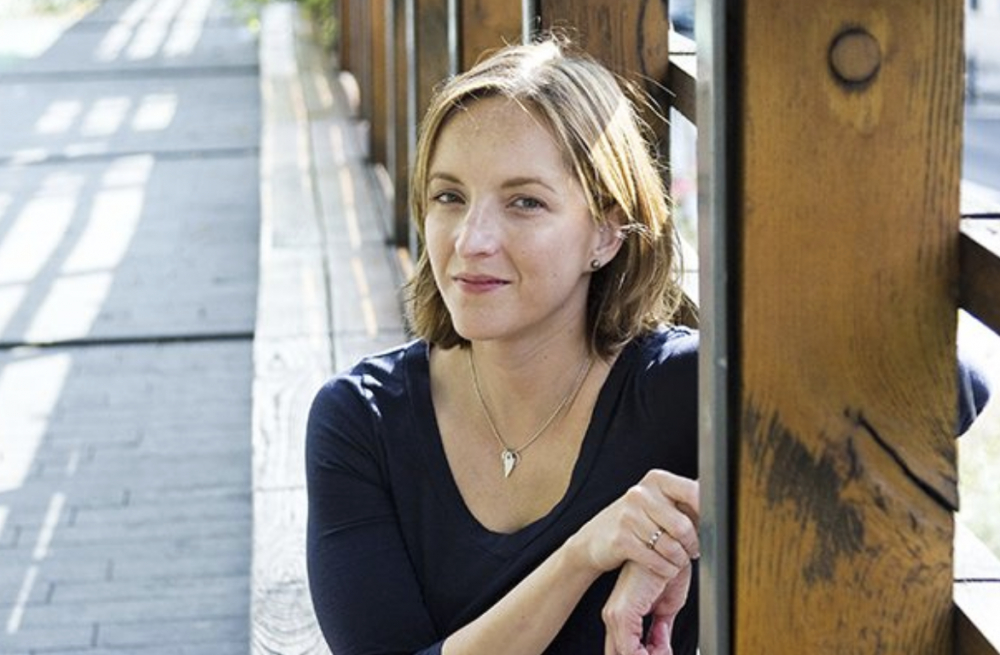
Rebecca Makkai autographs printer’s galleys from her latest book.
Rebecca Makkai gave a reading of her critically acclaimed book The Great Believers last Thursday at the Literary House at Washington College in Chestertown. The Great Believers won the Andrew Carnegie Medal for excellence in fiction, the LA Times Book Prize, was on the New York Times Ten Best Books of 2018, and was a finalist for the 2018 National Book award and the 2019 Pulitzer Prize.
Over the past 10 years, Makkai has written three books—The Borrower (2011), The Hundred-Year House (2014) and The Great Believers (2018), as well as a short story collection Music for Wartime (2015). Her books deal with themes of loss, authenticity, betrayal, tragic flaws, sexual identity, coming of age, living in times of crisis and the importance of artistic communities. There is usually a connection with Chicago and its surrounding suburbs where Makkai was born and raised and still lives with her husband, two daughters and rescue puppy. When asked why the focus on Chicago, she said she finds the city exciting, weird and magical.
The Great Believers tells a riveting tale of the AIDS epidemic in Chicago during the 1980’s and its subsequent effect on people it touched. The book effectively uses flashbacks and flash forwards between the 1980’s and 2015, with a subplot of a woman connected to the lost generation artists of the 20’s.
When writing The Great Believers, Makkai said she worried if she had the right to tell this story of the AIDS epidemic given that she’s a heterosexual woman. She said that it has since been pointed out to her that her situation enabled her to present a different and more holistic perspective to the AIDS tragedy and its ongoing ripple effect. “I was able to be removed enough while doing my research that I could tell the story of the long arm of grief that the AIDS epidemic extended to—sisters, brothers, future generations, etc. Also, the Chicago perspective of AIDs in the 80’s really hadn’t been thoroughly explored. Most attention was paid to New York and San Francisco. I was amazed at how little focus Chicago got during this epidemic. Obviously the crisis is not over. More than a million people in this country are still infected with H.I.V.”
The Great Believers is much more than a story of AIDS. Makkai said that she hoped that her readers would see the book’s life affirming focus and appreciate the joy and humor in it. She said many people who have read the book have told her that the book motivated them to reach out to others or ask about an uncle or relative who may have not been mentioned for a long time. They told her they realized it was important to hear their stories.
I asked Makkai about some of the writers she feels are currently under appreciated or of whom readers may be unaware. She mentioned Julie Otsuka (When the Emperor was Divine and The Buddha in the Attic), Helen Phillips (The Need and The Beautiful Bureaucrat), and Samuel Park (The Caregiver), who died at 41 years old from stomach cancer—a beautiful book that he was unable to promote because of his early death. .
The Great Believers has been optioned for television by Amy Poehler’s Paper Kite Productions. Makkai has already started working on her next novel. She is on the MFA faculties of Sierra Nevada College and Northwestern University and is Artistic Director of StoryStudio Chicago.
Maria Grant served as Principal-in-Charge of the Federal Human Capital practice of Deloitte Consulting where she advised several Federal agencies and major private sector corporations throughout the U.S.. Since her retirement from Deloitte, she has been HR Director for a nonprofit organization and focused on reading, writing, music, travel, gardening and nature. She cherishes the hummingbirds that gather daily just outside her screened porch overlooking Island Creek.



Write a Letter to the Editor on this Article
We encourage readers to offer their point of view on this article by submitting the following form. Editing is sometimes necessary and is done at the discretion of the editorial staff.